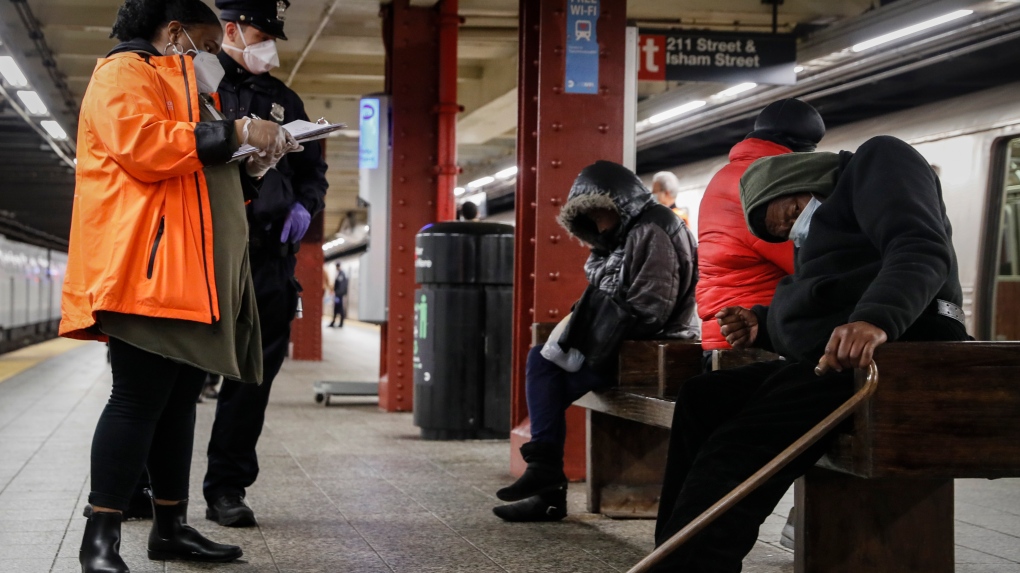NEW YORK -
New York City's mayor on Tuesday said he was directing police and city medics to be more aggressive about getting severely mentally ill people off the streets and subways and into treatment, even if it means involuntarily hospitalizing some people who refuse care.
"These New Yorkers and hundreds of others like them are in urgent need of treatment, yet often refuse it when offered," Mayor Eric Adams said at a news conference, noting the pervasive problem of mental illness has long been out in the open.
"No more walking by or looking away," the mayor said, calling it "a moral obligation to act."
The mayor's directive marks the latest attempt to ease a crisis decades in the making. It would give outreach workers, city hospitals and first responders, including police, discretion to involuntarily hospitalize anyone they deem a danger to themselves or unable to care for themselves.
"The very nature of their illnesses keeps them from realizing they need intervention and support. Without that intervention, they remain lost and isolated from society, tormented by delusions and disordered thinking. They cycle in and out of hospitals and jails."
State law generally limits the ability of authorities to force someone into treatment unless they are a danger to themselves, but Adams said it was a "myth" that the law required a person to be behaving in an "outrageously dangerous" or suicidal way before a police officer or medical worker could take action.
As part of its initiative, the city is developing a phone line that would allow police officers to consult with clinicians.
The mayor's announcement was condemned as wrong-headed by some civil rights groups and advocates for the homeless.
"The Mayor is playing fast and loose with the legal rights of New Yorkers and is not dedicating the resources necessary to address the mental health crises that affect our communities," said Donna Lieberman, executive director the New York Civil Liberties Union.
"Forcing people into treatment is a failed strategy for connecting people to long-term treatment and care," she said.
The Coalition for the Homeless also denounced the mayor's plan, saying the city should focus on expanding access to voluntary psychiatric treatment.
"Mayor Adams continues to get it wrong when it comes to his reliance on ineffective surveillance, policing, and involuntary transport and treatment of people with mental illness," said the coalition's executive director, Jacquelyn Simone.
Other groups welcomed the mayor's overtures even if they remain skeptical about how police would ultimately handle the mentally ill.
"We agree with the spirit of Mayor Adams address, which, you know, very much centres around confronting this human problem with compassion and sensitivity," said Jeffrey Berman, the an attorney for the mental health unit of the Legal Aid Society.
"We need fixes within the criminal legal system so that those people who do end up arrested can find a way out with treatment and support in the community and a road to real recovery and not jail," he said.
The Legal Aid Society, along with several community-based defender services, said the mayor was correct in noting "decades of dysfunction" in mental health care. They argued state lawmakers "must no longer `punt"' to address the crisis and approve legislation that would offer treatment, not jail, for people with mental health issues.
State lawmakers have been considering such legislation that would widen diversion programs for the mentally ill, a move supported by public defender groups.
Adams has called for an expansion of the use of 1999's "Kendra's Law," which allows courts to order defendants with mental illness to complete treatment.
The law was named after Kendra Webdale, who died after being pushed onto the subway tracks by a man with a history of mental illness.
Adams was thrust into the city's mental health crisis when just days after being sworn into office a New York woman was shoved into the path of incoming train, stoking public concerns over random attacks by people struggling with mental illness and homelessness.
Soon after, the mayor announced a subway safety plan and vowed to expand outreach teams. Critics called the plan a crackdown on the mentally ill and the homeless.
The mayor said he has begun deploying teams of clinicians and police officers to patrol the busiest subway stations. The city also was rolling out training to police officers and other first responders to help them provide "compassionate care" in situations that could cause the involuntary removal of a person showing signs of mental illness in public places.
"It is not acceptable for us to see someone who clearly needs help and walk past," Adams said.
A spokesperson for New York Gov. Kathy Hochul said the city's plan builds on mutual efforts to increase capacity at psychiatric hospitals, as well as expand outreach teams in subways.
--------------------
Maysoon Khan, a corps member for The Associated Press/Report for America Statehouse News Initiative, contributed to this report from Albany, New York.








































